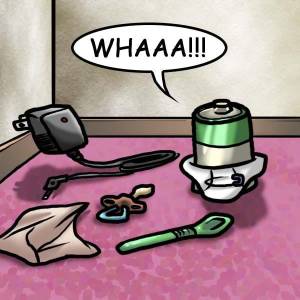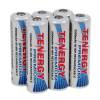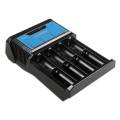Proper Care and Feeding: NiMH Battery FAQs

Q: What does NiMH stand for?
A: The material is Nickel Metal Hydride (NiMH) which has many advantages over other battery construction materials.
Q: What is meant by battery memory?
A: Older generation and batteries with other chemical make-up were subject to a memory effect. This is when a battery must be fully drained before recharge or their capacity is reduced. The New Generation of NIMH batteries do not develop a memory effect and can be recharged at anytime during usage cycle. When uncertain about battery charge level or condition, recharge it.
Q: What is the mAh rating mean?
A: This is a rating of energy storage capacity mAh = “milli-ampere hours”. So if you are comparing batteries to a AA with a 2000 mAh rating, it will have twice the capacity of a 1000 mAh rating.
Q: What is the best application for NiMH batteries?
A: Most all applications where there is a high energy consumption and demand, is where NiMH belongs. The most popular applications are digital cameras, flashlights, and toys. If you find yourself constantly buying alkaline batteries for an application, then you should consider using rechargeable NiMH.
Q: How many times can a NiMH battery be recharged?
 A: Lower capacity rechargeable AA batteries of 1700 up to 2000mAh can be recharged up to 1000 times in overnight slow charge mode, while 2100 to 2400 mAh rechargeable batteries can be recharged up to 600 to 800 times in overnight slow charge mode.
A: Lower capacity rechargeable AA batteries of 1700 up to 2000mAh can be recharged up to 1000 times in overnight slow charge mode, while 2100 to 2400 mAh rechargeable batteries can be recharged up to 600 to 800 times in overnight slow charge mode.
The new higher capacity AA 2500 mAh rechargeable batteries have greater power capacity, but they can only be recharged approx 500 times in the overnight mode. Capacity improvement or quick charging will always decrease the number of cycles. Every cell available on the market above 2100 mAh will have below 1000 charge cycles.
Q: What applications are not good places to use NiMH batteries?
A: Any situation where the battery is not used within a 30 day period or low energy draw devices, for example smoke alarms, emergency flashlights, clocks, TV remotes, etc.
Q: Why won’t NiMH batteries work in some applications such as smoke alarms?
A: NiMH batteries self discharge about 1% per day so if used in a low energy consummation or stand-by device, the battery will only last about 90 days before requiring recharge.
Q: Can I use a higher rated mAh battery in my electronic device (i.e. 1800mAh vs. 2000mAh)?
A: Yes, the mAh rating will give you longer run times between recharges. The higher rated mAh of a battery has no effect on electronic devices other than they allow longer term use.
Q: Why are AA and AAA batteries rated at 1.2 volts and alkaline batteries rated at 1.5 volts?
A: In fact, over the course of their discharge, alkaline batteries actually average about 1.2 volts. The main difference is that an alkaline battery starts at 1.5 volts and gradually drops to less than 1.0 volts. NiMH batteries stay at about 1.2 volts for almost 80% of their discharge cycle. Once alkaline batteries discharge to 50% capacity, it will be delivering a lower voltage than a NiMH battery.
Q: What you NEVER want to do with replaceable batteries?
A:
- Never mix batteries from different manufacturers
- Never mix batteries of different capacities
- Never mix batteries of different chemistries, i.e. NiCd, NiMH, Lithium, etc.
- Never DROP the battery if you can help it as NiMH batteries damage internally quite easily
- Never store NiMH in the refrigerator
- Never expose to extreme heat
Q: Do NiMH batteries lose capacity over time?
A: Yes, but nothing drastic. About 10 to 15% of the battery mAh capacity will be lost at the 400 to 800 recharge level. This will vary greatly because of battery and charger quality, along with how the consumer treats their batteries.
Q: When I receive my batteries do I need to charge them?
 A: Yes, before you use them for the first time, you need to charge your NiMH batteries fully. Please note that for new NiMH batteries, it is often necessary to cycle them at least three to five times or more before they reach peak performance and capacity. The first several times that you use your NiMH batteries you may find that they run down (discharge) quickly during use. Don’t worry, this is normal until the batteries actually structure internally.
A: Yes, before you use them for the first time, you need to charge your NiMH batteries fully. Please note that for new NiMH batteries, it is often necessary to cycle them at least three to five times or more before they reach peak performance and capacity. The first several times that you use your NiMH batteries you may find that they run down (discharge) quickly during use. Don’t worry, this is normal until the batteries actually structure internally.
Q: Is there a difference in chargers. i.e, fast, slow, microprocessor controlled, etc?
 A: Yes, there are differences in the different chargers on the market today. If the charger was designed and sold in the past couple years and specifically says it is made to charge NiMH batteries you are probably okay. Most of the new chargers use a small computer chip to manage the charge and you should be getting at least 500 charges from your batteries. If not, buy a new charger. Some of the no name batteries sometimes have a short life. Fast chargers also tend to give shorter battery life of less than 500 charges.
A: Yes, there are differences in the different chargers on the market today. If the charger was designed and sold in the past couple years and specifically says it is made to charge NiMH batteries you are probably okay. Most of the new chargers use a small computer chip to manage the charge and you should be getting at least 500 charges from your batteries. If not, buy a new charger. Some of the no name batteries sometimes have a short life. Fast chargers also tend to give shorter battery life of less than 500 charges.
Q: How do dispose of old NiMH batteries?
A: This is an easy one! While it is safe and legal in most states to dispose of your NiMH battery in your regular trash, we always encourage recycling whenever possible.


